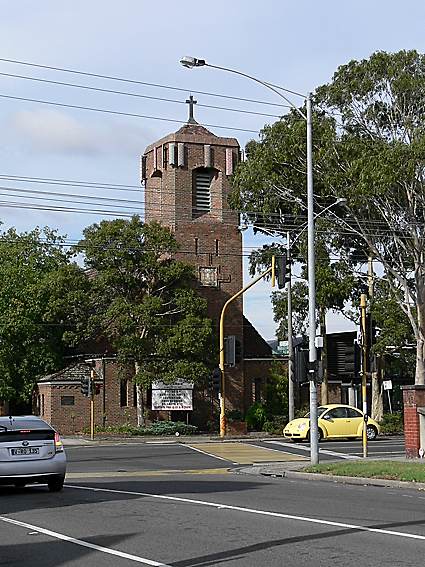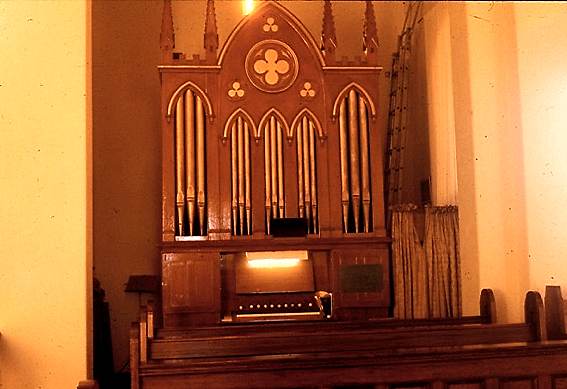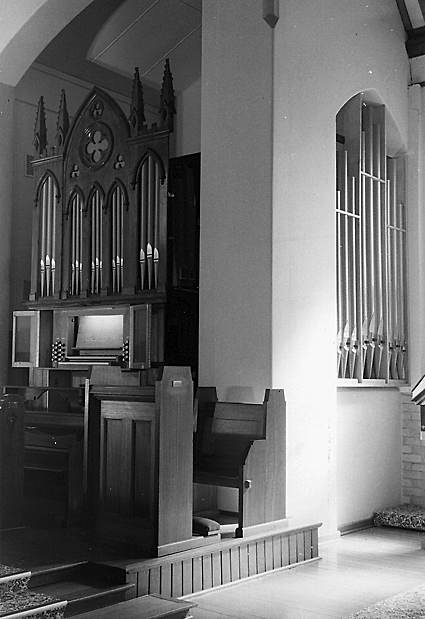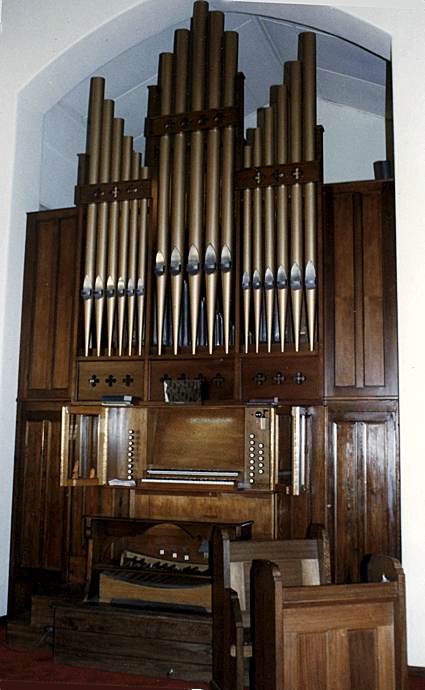
Christ Church, Ormond: the exterior from the north
[photograph by John Maidment (27 February 2013)]

Christ Church, Ormond: the exterior from the north
[photograph by John Maidment (27 February 2013)]
Historical and Technical Documentation by John Maidment
© OHTA, 2013 (last updated February 2013)
On Sunday 12 July 1937, the first section of the new Christ Church, Ormond, designed by Louis R. Williams, was dedicated.1 It was subsequently reported:
The first thanksgiving service in the new section of the Christ Church of EngIand, Ormond, was conducted yesterday by the vicar (the Rev. W. Perry Martin). The building, which consists of two vestries, a sanctuary, and an organ chamber, cost £1,600, but when the new brick church is completed the total cost will be £4,000.2 The building was completed in the 1950s through the extension of the nave and erection of a tall tower with flanking porches, again to the design of Louis R. Williams.

Christ Church, Ormond: the 1864 George Fincham organ
[photograph by John Maidment (early 1970s)]
The organ was the first built in Victoria by George Fincham. It was completed in 18643 and sold to the Congregational Church, Victoria Parade, East Melbourne where the opening of the organ took place on 10 August 1865. The following day, a report of the events was published:
In celebration of the opening of the organ just erected in the East Melbourne Congregational Church, a concert of sacred music was given at that building last evening. The performers mainly consisted of Miss Mortley, the ladies and gentlemen of the choir, and a few amateurs as volunteers. Mr. G.F. South presided at the organ. The programme was composed of sacred music, which was very fairly performed, Miss Mortley particularly distinguishing herself. Miss Fanny Beeves was to have sung, but was prevented from attending. During the evening, Mr. South performed two solos on the organ, which appears to be an excellent instrument. Its tone is rich and full, its swell effective, and its upper notes clear and sound. It has ten stops altogether, and about 500 pipes. Its cost was £180, and it was built by Mr. George Fincham, of Bridge road, Richmond. The Rev. J. Beer, pastor of the church, presided as chairman during the evening, and addressed the audience.4
This organ incorporated a fairly complete manual chorus and a Gothic-style case, which appears to have been modelled upon the architectural style of the East Melbourne church.
| MANUAL (enclosed) Open Diapason Stopped Diapason Dulciana Principal Flute Twelfth Fifteenth Oboe Great to Pedal PEDAL Bourdon |
8 8 8 4 4 2-2/3 2 8 16 |
open wood bass gvd.bass TG |
Compass: 56/29
Mechanical key and stop action
2 composition pedals
Lever swell pedal5
When the Congregational Church closed in the late 1930s, the organ was bought by Christ Church, Ormond where it was installed by C.W. Andrewartha c.1939 without alteration and it remained in this state until 1978.

Christ Church, Ormond: the organ following the rebuild by John Larner
[photograph by John Maidment (1978)]
This organ was rebuilt and enlarged in 1978 by Perth organbuilder John Larner in association with the church organist Julie Dunlop. A second manual division was added, and the action and console replaced. The original pipework and windchest remained to form the Great Organ and the Fincham casework was retained.
| GREAT Open Diapason Stopped Diapason Dulciana Principal Flute Twelfth Fifteenth Mixture 19.22 SWELL Clarabella Viola da Gamba Gemshorn Flageolet Sesquialtera 12.17 Quint Mixture 22.26 Cornopean Oboe Tremulant PEDAL Bourdon Flute Fifteenth Bassoon Spare slide for reed Great to Pedal Swell to Pedal6 |
8 8 8 4 4 2-2/3 2 II 8 8 4 2 II 1-1/3 II 8 8 16 8 4 16 4 6 |
new metal bass CC-BB new Walker, from Winthrop Hall, Perth gvd.bass TC Fincham, with new bass A A new 6 |

Christ Church, Ormond: the organ following the rebuild by George Fincham & Sons Pty Ltd
[photograph by John Maidment (1983)]
In 1983 this organ had become unsatisfactory and was rebuilt in that year by George Fincham & Sons Pty Ltd. The pipework was revoiced by Michel Alcouffe, a new console installed, new pedal and stop action incorporated, a Pedal 4ft reed inserted, and new upper case installed, the original Fincham case being mounted on one of the walls of the porch.7
This is a sad outcome for the first organ built by George Fincham, and one which could have been avoided had the church, in spite of strong representations, been supportive of preserving such a rare and valuable instrument.
1. The Argus, 5 July 1937, p.10
2. Ibid., 19 July 1937, p.5
3. E.N. Matthews, 'Further Notes on George Fincham's First Australian Organ', Victorian Organ Journal, vol.1, no.10 (August 1973), p.11
4. The Argus 11 August 1865, p.5
5. Specification noted by John Maidment 1966
6. Specification from Victorian Organ Journal, vol.6, no.9 (August 1978), p.12
7. Notes of John Maidment 1983